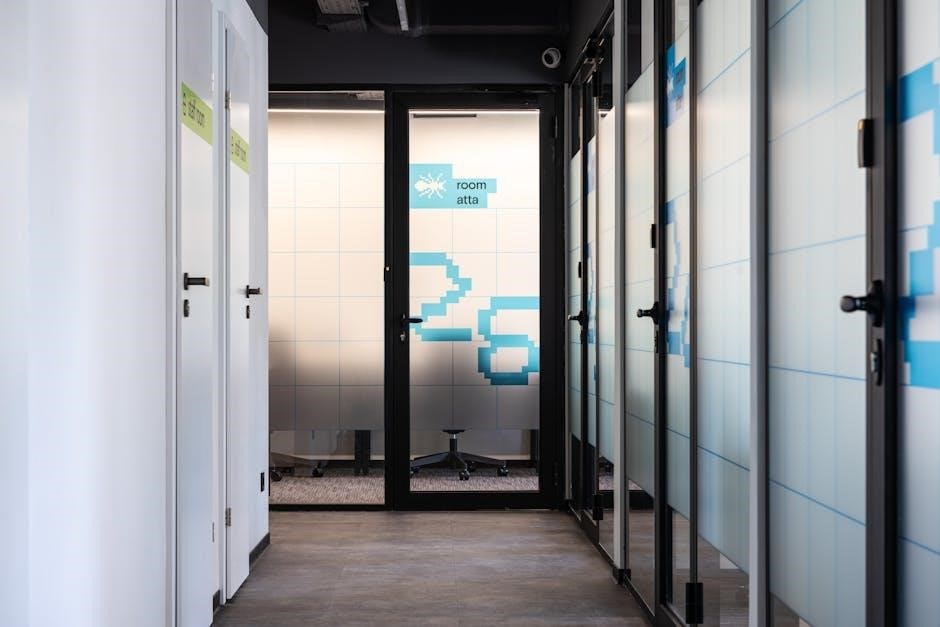Instructional design conferences are events where professionals gather to share insights on creating effective learning experiences. They cover topics like emerging technologies, design thinking, and career development, offering networking opportunities and expert-led sessions to enhance skills and stay updated on industry trends.
Overview of Instructional Design and Its Importance
Instructional design is a systematic approach to creating learning experiences that enhance performance and engagement. It combines psychology, education, and technology to develop structured environments for effective learning. The field emphasizes clear objectives, learner-centered strategies, and measurable outcomes, making it crucial for both academic and corporate training. By focusing on how people learn, instructional design ensures that content is relevant, accessible, and impactful. Its importance lies in its ability to bridge gaps in knowledge and skills, fostering continuous improvement in education and workplace development. As technology evolves, instructional design adapts, integrating innovative methods to meet modern learning demands and expectations.

Why Attend Instructional Design Conferences?
Attending instructional design conferences offers unparalleled opportunities for professional growth, networking, and skill enhancement. These events provide access to leading experts, cutting-edge tools, and innovative strategies, enabling attendees to stay ahead in the field. Conferences also foster connections with peers and thought leaders, creating a collaborative environment for sharing ideas and best practices. With sessions on emerging technologies, creative approaches, and future trends, participants gain insights to improve their work and adapt to industry changes. Additionally, conferences often include workshops and hands-on activities, allowing for practical application of new knowledge, making them invaluable for both seasoned professionals and newcomers seeking to advance their careers.

Key Topics Discussed at Instructional Design Conferences
Discussions focus on emerging technologies, design thinking, and participatory design, exploring trends, strategies, and tools to enhance learning experiences and integrate innovative approaches in instructional design.
Emerging Technologies in Instructional Design

Emerging technologies like AI, VR, and AR are revolutionizing instructional design, enabling immersive and personalized learning experiences. Conferences explore how these tools enhance engagement, accessibility, and adaptability in educational settings. Discussions highlight innovative applications, such as interactive simulations and adaptive learning platforms, which cater to diverse learner needs. Experts share insights on integrating these technologies seamlessly into curriculum design, ensuring they align with learning objectives. The focus is on leveraging technology to create dynamic, inclusive, and impactful learning environments, preparing educators and designers for the future of education. These advancements are reshaping traditional methodologies, making learning more interactive and effective.
Design Thinking and Creative Approaches to Learning
Design thinking and creative approaches are central to modern instructional design, emphasizing empathy, innovation, and user-centered solutions. Conferences highlight methodologies like tinkering, making, and participatory design, which foster hands-on, collaborative learning experiences. Speakers explore how these approaches can transform traditional education by encouraging problem-solving and creativity. Workshops often demonstrate haptic and interactive techniques, providing practical tools for educators. These methods not only enhance learner engagement but also promote inclusivity by tailoring experiences to diverse needs. By integrating creative strategies, instructional designers can craft meaningful and adaptive learning environments that inspire and empower learners, making education more dynamic and effective in a rapidly changing world.

Networking Opportunities at Instructional Design Conferences
Conferences offer invaluable networking chances to connect with professionals, attend events, and engage with industry leaders, helping to build relationships and expand career opportunities in instructional design.
Building Professional Connections
Building professional connections at instructional design conferences is crucial for career growth. Attendees can engage in various networking events, both paid and free, depending on their goals. These events provide opportunities to meet fellow professionals, share experiences, and learn from industry leaders. Networking can lead to new job opportunities, collaborations, and mentorship. Engaging with speakers and participants fosters a sense of community and mutual support; Additionally, these connections can help in building a strong portfolio and enhancing skill sets, which are essential for success in instructional design. Conferences serve as a platform to expand one’s professional network and advance in the field effectively.
Engaging with Industry Leaders and Speakers
Engaging with industry leaders and speakers at instructional design conferences offers invaluable insights into cutting-edge practices and innovations. These experts share real-world applications of emerging technologies, creative learning strategies, and future trends. Attendees can participate in Q&A sessions, workshops, and informal conversations, fostering deeper understanding and inspiration. Interacting with speakers provides opportunities to gain practical tips, explore new methodologies, and discuss challenges in the field. Such interactions not only enhance professional knowledge but also open doors for mentorship and collaboration. The presence of renowned speakers ensures that participants receive high-quality, actionable information, making the conference a rich learning experience for all attendees. This interaction is a key highlight of the event.
Learning Strategies and Models Presented
Instructional design conferences showcase effective learning strategies and innovative models, emphasizing evidence-based approaches to enhance educational experiences. These methodologies are crucial for creating engaging and impactful learning environments, benefiting both educators and learners alike.

Effective Learning Objectives and Metacognitive Exercises
Instructional design conferences emphasize the importance of clear, measurable learning objectives to guide instructional strategies. Metacognitive exercises encourage learners to reflect on their thinking, enhancing self-awareness and problem-solving skills. These approaches help create structured, engaging learning environments that foster deeper understanding and retention. Future Search and Participatory Design Principles are often highlighted as innovative methods to align learning goals with real-world applications. By integrating these techniques, educators can design courses that not only meet learning objectives but also empower learners to take an active role in their educational journey, ensuring long-term knowledge retention and practical application.
Future Search and Participatory Design Principles
Future Search is a collaborative planning approach that empowers participants to envision and shape their future collectively. It focuses on identifying shared goals and actionable strategies, fostering innovation and alignment among stakeholders. Participatory Design Principles involve actively engaging end-users in the design process, ensuring that solutions are tailored to their needs and contexts. These principles are increasingly integrated into instructional design to create learner-centered experiences. By involving stakeholders early and encouraging collaborative problem-solving, instructional designers can develop more relevant and effective learning solutions that address real-world challenges and promote sustainable change.
Career Development and Instructional Design

Career Development and Instructional Design

Instructional design conferences offer valuable insights for career growth, emphasizing essential skills like e-learning development and portfolio building. They highlight that formal education isn’t always required, as resources and hands-on application can suffice for success in the field.
Landing Your First Instructional Design Job
Landing your first instructional design job is a key topic at conferences, offering practical advice for newcomers. While formal education isn’t always required, building a strong portfolio showcasing even hypothetical projects is essential. Networking opportunities at conferences help connect aspiring designers with professionals, providing insights into industry expectations and tools. Presentations often highlight the importance of hands-on experience and applying instructional design principles creatively. Comprehensive guides and resources are also shared, emphasizing the need to demonstrate both technical and soft skills. These events empower attendees with the confidence and strategies to successfully transition into the field.
Building a Portfolio and Skill Set for Success
Building a portfolio and skill set is crucial for success in instructional design. Conferences often emphasize the importance of showcasing projects, even hypothetical ones, to demonstrate creativity and understanding of design principles. Attendees learn about essential tools like Articulate Storyline and Adobe Captivate, as well as strategies for applying design thinking. Networking provides opportunities to gain feedback from experienced professionals. Continuous learning is highlighted, with resources like books and online courses recommended to refine skills. A strong portfolio not only highlights technical abilities but also the ability to create engaging, user-centered learning experiences, making it a cornerstone of career advancement in the field.
Best Practices for Conference Participation

Attending instructional design conferences requires strategic planning, such as identifying valuable networking events, preparing engaging presentations, and utilizing conference resources effectively to maximize learning and professional growth.
Maximizing the Value of Networking Events
Networking events at instructional design conferences are crucial for building professional connections. Attendees can engage in meaningful conversations, share experiences, and collaborate on innovative projects. By actively participating in these events, individuals can establish relationships with industry leaders, gain insights into emerging trends, and explore new opportunities. Effective networking involves setting clear goals, such as meeting specific professionals or learning about certain topics. Following up with contacts after the event ensures that connections are maintained and can lead to future collaborations. These interactions not only enhance personal growth but also contribute to the broader development of the instructional design field.
Creating an Impactful Presentation Title and Content
A strong presentation title is essential for grabbing attention and conveying the core message. It should be clear, engaging, and reflective of the content. When crafting the title, aim for a balance between creativity and clarity to ensure it resonates with the audience. The content should be well-structured, focusing on key points that align with the title. Use visual aids, practical examples, and interactive elements to enhance engagement. Clarity and conciseness are crucial to maintain the audience’s interest. A well-crafted presentation not only communicates ideas effectively but also enhances the speaker’s credibility and provides lasting value to attendees.
Instructional design conferences offer invaluable insights and networking opportunities. They help professionals stay updated on trends like emerging technologies and design thinking, fostering continuous growth in the field.
Summarizing the Benefits of Attending Instructional Design Conferences
Attending instructional design conferences provides unparalleled opportunities for professional growth, networking, and skill enhancement. These events offer insights into emerging technologies, creative learning strategies, and future trends in instructional design. Professionals gain access to expert-led sessions, hands-on workshops, and collaborative environments that foster innovation and problem-solving. Networking opportunities allow attendees to build connections with industry leaders and like-minded peers, opening doors to new career possibilities and collaborations. Additionally, conferences often feature practical tips on creating impactful presentations and maximizing the value of networking events. Overall, these gatherings are essential for staying updated, inspired, and connected in the ever-evolving field of instructional design.
Future Trends and Continuous Learning in Instructional Design
Instructional design is evolving rapidly, with future trends emphasizing emerging technologies like AI, VR, and AR to enhance learning experiences. Continuous learning is crucial for professionals to adapt to these innovations and integrate them into their practices. Conferences highlight these trends, offering insights into design thinking, participatory design, and future search principles. Staying updated on these advancements ensures instructional designers remain competitive and effective in creating engaging, adaptive, and inclusive learning environments. By embracing lifelong learning, professionals can leverage these trends to shape the future of instructional design and deliver impactful, modern educational solutions.
